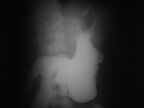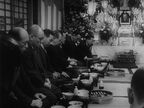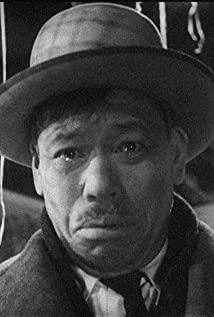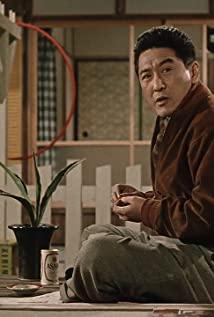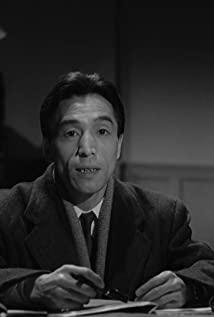The first time I watched Kurosawa Akira's movie was Rashomon, but I felt that the director's way of making movies was really unique and left a deep impression. After watching the Seven Samurai, I was even more impressed, so I watched it this time. Before the desire to live, I had a kind of expectation for the movie, or the expectation for Akira Kurosawa.
From my point of view, the film is based on three main lines around Watanabe.
The first small main line is Watanabe's search for the meaning of life. He has been in the Citizens Section for nearly 30 years without any disturbances and never asked for leave, but in these 30 years, I don’t think he has any self-identification. He just kept repeating the same actions and repeatedly facing the same subordinates. Dealing with trivial chores with no new ideas, just like this for thirty years. I don't know which writer said: The length of a person's life is not how long he lives, but how many days he remembers. I think Watanabe has no sense of identity for Watanabe himself in the past 30 years, and when he heard the nickname "Mummy" given to him by his subordinates, his expression instantly froze, it was not angry His face was expressionless, but the tenderness of his great self-identification. Yes, he felt like a mummy without the light and joy of life. After so many years, he was suffering from stomach cancer. When he learned that he only had a year and a half to live, he decided to find something to save himself, not life, but to save the meaning of his life. At the end of his life, he finally found his answer in the music of happy birthday.
The second main line is that raising children and preventing old age is actually an ethereal thing. After Watanabe learned that he had advanced gastric cancer, he came home and overheard his son and daughter-in-law discussing buying a house. The daughter-in-law proposed to use his pension as a guarantee, and the son also said, "Anyway, he can't bring him into the coffin. ". Watanabe chose to live in widowhood in order to take care of his son after his wife died. After so many years, his son has grown up but he has no sympathy for him. I think, at such a time when his life is about to end, his heart is cold and desolate, so he is in When drinking with Oda, when he heard Oda say that he actually loves his son the most, Watanabe smiled. It should be a happy smile, but then he said angrily: I don't have a son. This is his dissatisfaction with his son. He always wants to get love in return from his son. Just like that night, when the light man called Dad, he immediately ran upstairs happily. He thought his son wanted to talk to him, but As soon as he ran upstairs, it turned out that his son just wanted him to lock the door. At that moment, his back, which had straightened up with joy, suddenly bent down again. The slow and trembling pace was a bleak portrayal of Watanabe's heart. In fact, as the old saying goes, "there are ten children in the mother's belly, but Ke'er has no mother in her heart". The relationship between Watanabe and his son is contradictory. The son always feels that all his father's efforts are deserved, but what Watanabe desires is only the son's true concern for him.
The third main line is the consumption of human life by the system. In fact, it is unfair to say this to the system. After all, it is not the system that has changed you. Your attitude towards life is your choice. When everyone criticizes the system, I can't help but feel wronged. There will always be people here. Find your own values. There is indeed a phenomenon in the system that things are simple and complicated and have no freshness, but is it really as useless as everyone criticizes? Watanabe has wasted 30 years in the system without doing anything, and Oda's reason for resigning is also: What's the point of spending a day doing something that can be solved in an hour? Yes, but isn't it your choice to choose how much time it takes to get it done? In fact, it is not the system that caused this phenomenon, but the people within the system. In the movie, at Watanabe's memorial service, a staff member excused himself for his inaction after drinking and said: It's not that we don't want to do it, but that we do it. Living will offend people, so I have to pretend to be working. Maybe this is the biggest root cause. Some people choose to do nothing in order to keep their jobs for fear of offending others. The conversations of some institutional personnel at Watanabe's memorial service showed that this phenomenon is not very isolated, but widespread. How many people surrounded the deputy mayor and said that this was an unconscionable speech, nodded and bowed, and agreed. The same is true for the thirty years before Watanabe.
In the end, Watanabe found his meaning, and in the last six months, he extended his life to the hearts of the citizens. No matter what those people in the system did, the eyes of the people were sharp. Watanabe offended the triad, offended his superiors and peers, and finally got things done, because he only had half a year, he was not afraid, he had to do practical things. Watanabe moved those people in the system, so after drinking, those people expressed their willingness to do practical work for the common people from tomorrow, but the next day, as usual, they played football in case of trouble.
I think it's a lucky thing to know what you're going to do very early on. Don't go to the end of your life like Watanabe to know it's too late to find answers.
No matter what difficulties you encounter, face them with a smile and be firm in the way you want to go.
View more about Ikiru reviews



